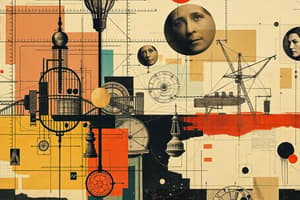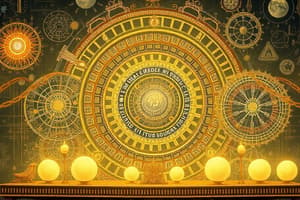Podcast
Questions and Answers
Apa yang menjadi fokus utama dalam Teori Bilangan?
Apa yang menjadi fokus utama dalam Teori Bilangan?
- Struktur pemerintahan dan fungsinya
- Divisibilitas dan bilangan bulat (correct)
- Pengaruh politik dalam pemilihan umum
- Proses pembuatan kebijakan publik
Apa yang dimaksud dengan pemisahan kekuasaan dalam pemerintahan?
Apa yang dimaksud dengan pemisahan kekuasaan dalam pemerintahan?
- Penghindaran konflik antara negara dan masyarakat
- Pencarian konsensus antara partai politik
- Pengembangan ideologi politik baru
- Pembagian tanggung jawab di antara cabang-cabang pemerintahan (correct)
Mengapa pemahaman tentang ideologi politik penting?
Mengapa pemahaman tentang ideologi politik penting?
- Karena ideologi hanya relevan di masa lalu
- Karena semua ideologi menghasilkan hasil yang sama
- Karena ideologi memengaruhi keputusan dan kebijakan pemerintahan (correct)
- Karena ideologi tidak berpengaruh pada kebijakan publik
Apa yang menggambarkan partisipasi politik yang aktif?
Apa yang menggambarkan partisipasi politik yang aktif?
Apa yang mencakup kajian tentang globalisasi dalam studi kewarganegaraan?
Apa yang mencakup kajian tentang globalisasi dalam studi kewarganegaraan?
Apa yang dijelaskan oleh Hukum Newton kedua?
Apa yang dijelaskan oleh Hukum Newton kedua?
Apa yang dimaksud dengan energi kinetik?
Apa yang dimaksud dengan energi kinetik?
Apa yang diukur oleh frekuensi gelombang?
Apa yang diukur oleh frekuensi gelombang?
Apa yang terjadi pada energi ketika berpindah dari satu bentuk ke bentuk lainnya?
Apa yang terjadi pada energi ketika berpindah dari satu bentuk ke bentuk lainnya?
Dalam termodinamika, entropi berkaitan dengan?
Dalam termodinamika, entropi berkaitan dengan?
Apa yang mencirikan gelombang elektromagnetik?
Apa yang mencirikan gelombang elektromagnetik?
Apa tujuan utama dari kalkulus integral?
Apa tujuan utama dari kalkulus integral?
Apa yang dipelajari dalam aljabar?
Apa yang dipelajari dalam aljabar?
Flashcards
Teori Bilangan
Teori Bilangan
Studi tentang sifat-sifat bilangan, khususnya bilangan bulat, termasuk bilangan prima, pembagian, aritmatika modular, dan konsep-konsep dasar lainnya.
Struktur Pemerintahan
Struktur Pemerintahan
Bagian-bagian penting dalam sistem pemerintahan, meliputi cabang legislatif, eksekutif, dan yudikatif.
Ideologi Politik
Ideologi Politik
Sistem keyakinan dan nilai-nilai politik. Contohnya kapitalisme, sosialisme, dan demokrasi.
Hak dan Kewajiban Warga Negara
Hak dan Kewajiban Warga Negara
Signup and view all the flashcards
Proses Pembentukan Kebijakan Publik
Proses Pembentukan Kebijakan Publik
Signup and view all the flashcards
Hukum Gerak Newton
Hukum Gerak Newton
Signup and view all the flashcards
Kekekalan Energi
Kekekalan Energi
Signup and view all the flashcards
Persamaan Energi Kinetik
Persamaan Energi Kinetik
Signup and view all the flashcards
Aljabar
Aljabar
Signup and view all the flashcards
Kalkulus Diferensial
Kalkulus Diferensial
Signup and view all the flashcards
Geometri
Geometri
Signup and view all the flashcards
Gelombang Elektromagnetik
Gelombang Elektromagnetik
Signup and view all the flashcards
Statistika
Statistika
Signup and view all the flashcards
Study Notes
Physics
- Classical Mechanics deals with the motion of objects under forces. Key concepts include Newton's Laws of Motion (Inertia, F=ma, Action-Reaction).
- Energy and its forms (kinetic, potential, thermal) are central to understanding physical processes. Conservation of energy is a fundamental principle, stating that energy cannot be created or destroyed, only transformed.
- Thermodynamics explores heat and temperature, with key concepts like entropy and the laws of thermodynamics. These laws dictate the direction and limits of energy transfer.
- Waves are disturbances that transfer energy. Types include mechanical waves (e.g., sound) and electromagnetic waves (e.g., light). Properties of waves include frequency, wavelength, and amplitude.
- Electricity and Magnetism are interconnected forces described by Maxwell's Equations. Electromagnetic fields and forces are fundamental to applications like generators and motors.
- Optics deals with the behavior of light, including reflection, refraction, and diffraction. Understanding these phenomena is crucial to applications like lenses and mirrors.
- Modern Physics explores concepts beyond classical physics. Relativity (special and general) describes the behavior of objects at high speeds and in strong gravitational fields. Quantum mechanics describes the behavior of matter at the atomic and subatomic level.
Math
- Algebra involves manipulating equations and expressions using variables. Key operations include addition, subtraction, multiplication, division, and solving for unknowns.
- Geometry studies shapes and figures, including lines, angles, triangles, quadrilaterals, and circles. Concepts include area, perimeter, volume, and trigonometric functions.
- Calculus deals with change and rates of change. It encompasses differential calculus (derivatives) and integral calculus (integrals). These tools are critical for modeling continuous processes.
- Statistics involves collecting, organizing, analyzing, interpreting, and presenting data. Key concepts include measures of central tendency (mean, median, mode), measures of variability (standard deviation), and probability.
- Discrete Mathematics focuses on mathematical structures that are not continuous, such as graphs, trees, and sets. This branch has various applications in computer science.
- Linear Algebra focuses on vector spaces, linear transformations, matrices, and linear equations. Applications include computer graphics and engineering.
- Number Theory looks at the properties of numbers, particularly integers. Topics include prime numbers, divisibility, modular arithmetic, and other fundamental number theoretic concepts.
Civics
- Government structures and functions are key topics, considering legislative, executive, and judicial branches. Constitutional principles, such as separation of powers and checks and balances, are essential elements.
- Political ideologies and their impact on policy and governance are studied, covering capitalism, socialism, and democracy. Understanding the variations within these ideologies is important.
- Civic rights and responsibilities are fundamental to democratic societies. Rights and duties of citizens are analyzed.
- Elections and voting systems provide the mechanism for participating in a democracy. Different systems exist, and various candidates and issues are involved.
- Public policy formation and implementation are processes that shape societal decisions. Understanding these processes is essential.
- Political participation and engagement explore ways citizens can influence the political process. Active citizenship and responsible participation are emphasized.
- Current events and historical contexts provide a framework for understanding present-day issues. Analysis of political issues is critical.
- Globalization and international relations form part of civic studies, as societies increasingly interact globally.
Studying That Suits You
Use AI to generate personalized quizzes and flashcards to suit your learning preferences.



